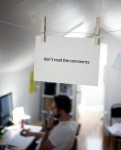A friend once described me as ‘the one with boundaries.’
Now, I’m not entirely sure it was meant as a compliment but I chose to interpret it as one.
When you’re newly self-employed it is so incredibly easy (and even advisable!) to say yes to every client and every project that comes your way. And we’re often so hungry for business we allow our clients to walk all over our deadlines, expectations, and tip toe over our boundaries.
But what if we never made those boundaries particularly clear?
In a perfect world, that client would apply a bit of Golden Rule logic when calling you on Saturday afternoon or dawdling on their invoice, but we teach people how to treat us and people frequently need to be taught in a rather blunt-if-loving way.
I do two things to establish (what I hope are) loving, mutually beneficial boundaries with clients:
1. I work on one small project with them before we commit to an on-going, on-retainer relationship
One of my secrets to a sane, sustainable, not-freaking-out-about-rent-this-month freelance life is having several clients on retainer - that way I know even if I sell zero ebooks and no ad space, my rent and bills are always covered.
But you wouldn’t jump into a Serious Business Relationship without a few dates. My clients and I might work through a few blog posts or a ghostwritten ebook before we dive into something big and committed. If they need more than three rounds of edits or want daily check-in phone calls, it’s probably not meant to be - for either of us.
2. I have a set of ‘collaboration guidelines’ (which you can totally copy)
A happy, healthy relationship - romantic, platonic, professional - requires open communication, knowing how your partner works best and what annoys the sweet bejesus out of them.
Enter my ‘collaboration guidelines.’ Once my client and I decide that we’re in it for the (relative) long-haul, I try to initiate a conversation about how each of us do our best work.
Verbatim, here’s the email I send them:
These will probably strike you as ‘holy crap obvious’ but they are all things that have (sadly) actually come up with previous clients. And I always feel that putting all our cards on the proverbial table from the get-go is the best policy.
So! Here are my ‘collaboration guidelines’!
* After being shorted by a client who’s a pastor (!) I ask that first-time clients pay for 100% of their package up front. After we’ve worked together for three months, we can create a different payment arrangement if you’d like.
* In an attempt to have an actual life outside of work, I try not to respond to emails or phone calls after 6:00 pm CST on weekdays or on at all on weekends. And I don’t expect you to, either. If I email you on a weekend or at night, please feel free to ignore it till the morning or Monday. 😉
* Whenever possible, I prefer email over phone calls. I work in coffee shops a lot and we all hate that person who talks loudly on their phone in coffee shops.
* I won’t call you unexpectedly if you won’t call me unexpectedly.
* My usual turnaround time for writing is 2-3 business days. It’s unlikely that I can write or edit something for a client that day or the next.
* In an effort to keep my email inbox under control, I like to limit communication to one or two long, information-filled emails each day. I promise I won’t email you one-liner emails if you won’t do that to me. 😉
* I will usually write your piece and share it with you in Google docs. You can add comments or suggest edits by clicking ‘insert’ and ‘comment.’
* I ask that all clients who have purchased a 10-hour package with me use those ten hours within three months of purchasing it.
Tell me how you work best and if these make sense!
….
The amazing thing? Every.single.time I’ve shared these with my clients they’ve been appreciative of my transparency and given incredibly valuable insights into how they work best.
One client likes confirmation that I received each email she sends me. Another has a list of words she doesn’t want included in the posts I ghost-write for her. A third prefers Trello comments over emails. And I’m totally happy to accommodate all of those needs now that I know!
Do you struggle to establish boundaries with clients? If you have any good tips, please share them in the comments!
P.S. How to deal with people unsubscribe/unfollow/troll your blog



















This is JUST what I needed to read today. It’s definitely time for me to set some better boundaries with clients and these are perfect. Thank you!
Thanks! So glad you found it useful!
The email one, I definitely need it!! I can receive up to 10 emails a day from a client sometimes…The worst is receiving those from past clients who you have finished to work with but have “just a little question”..
When I started my business I was too fast to answer. I’ve noticed that now that I wait a few hours before answering and that if I have too many mails, I’ll answer some of them the next day only, people stop sending me an email for a yes or a no.
Apparently, in ‘The Four Hour Work Week’ (which I haven’t read) Tim Ferris suggests that you wait 24 hours before responding to ANY client email! I’m not sure I could do that, but sometimes I’ll respond to their million emails with one long email. Also, when I do a one-off consulting session, I make sure when I send them the packet I say “my inbox is open to you for the next week.” 🙂
Honestly it depend on the email you receive. If it’s because there is an exchange of informations so that the project can go forward I usually answer fast but for the other things I really wait at least 24 hours because some people really believe that because you’re working with a computer you are always at their disposal any time during the day and that needs to stop.
I now consult my professional mailing box three times during the day: morning, lunch time and 4pm. I read Tom ferris and I think he advice only twice a day. That changed my life because my clients send less emails , I spend more time on important tasks for my biz and I’m less stressed.
I will be soon working on canned response so that clients won’t end up receiving nothing but will receive a mail explaining when I’ll get back to them or how mail answers work for me. I’ve to study that 😉
Love this! Your boundaries are pretty similar to the ones I try to set for myself. It’s so smart to be upfront about them right off the bat. I definitely plan to start doing that as well!
Oh goodness, I wish I had seen this a few months ago, we are working with a new vendor who loves to text (which I hate for business) and his emails are equally pointless. I might just have to send this to him!
Ohmygosh. Texting? ABSOLUTELY NOT. I’m sorry you had to deal with that!
Oh wow, yeah, I am absolutely going to borrow these guideline. Especially the part about unexpected phone calls. Those can literally tank my entire day to anxiety.
I have just made the decision to get 100% up-front as well, as I’m currently struggling with a client who is attempting to ignore my invoice for the second half of a $5k contract. Any suggestions for how to communicate to him that, no really, you do actually have to pay this second invoice, you signed a contract about this?
Oooof! That’s a tough one (and the reason I started to make people pay 100% in advance!)
This might help: https://www.freelancersunion.org/blog/2013/11/08/what-do-when-client-doesnt-pay-10-rules-live/
Of course I read this right *after* sending a touchy “boundaries-setting” email to a new-ish client. 🙂 You’re a rock star for sharing this!
My pleasure! Happy to help people learn from my mistakes 😉
[…] How to nicely set boundaries with your clients >>> […]
That email is freaking GENIUS. Adding it to my ‘must do’ list. Thanks for the can’t-believe-I-didn’t-think-of-that inspiration, Sarah xo
[…] How to (nicely) set boundaries with your clients. […]
[…] THREE / Setting up some “collaboration guidelines” so you can maintain a happy client relationship and a personal life (or whatever it is you want to do on Saturdays). […]
In the long run, setting boundaries makes everyone feel happier. People know what to expect and whether the working relationship will ultimately work out. I can’t imagine working without establishing boundaries and expectations first.